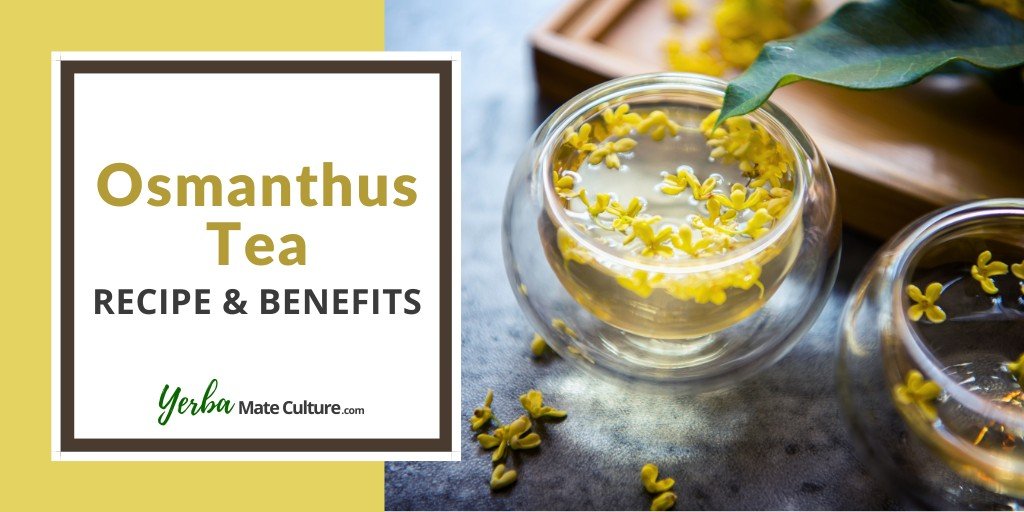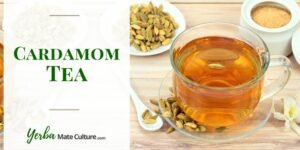Osmanthus tea is a fragrant and flavorful beverage that has been enjoyed for centuries, particularly in China where it originates.
Made from the delicate blossoms of the Osmanthus fragrans plant, this tea not only offers a delightful aroma and taste, but also provides a host of health benefits that you need to know!
Whether you’re aiming to improve your digestion, support brain function, or curb your appetite, osmanthus tea could be a wonderful addition to your daily routine.
Keep on reading and try my 2 Delicious Osmanthus Tea Recipes and learn more about the benefits of this healthy herbal tea!
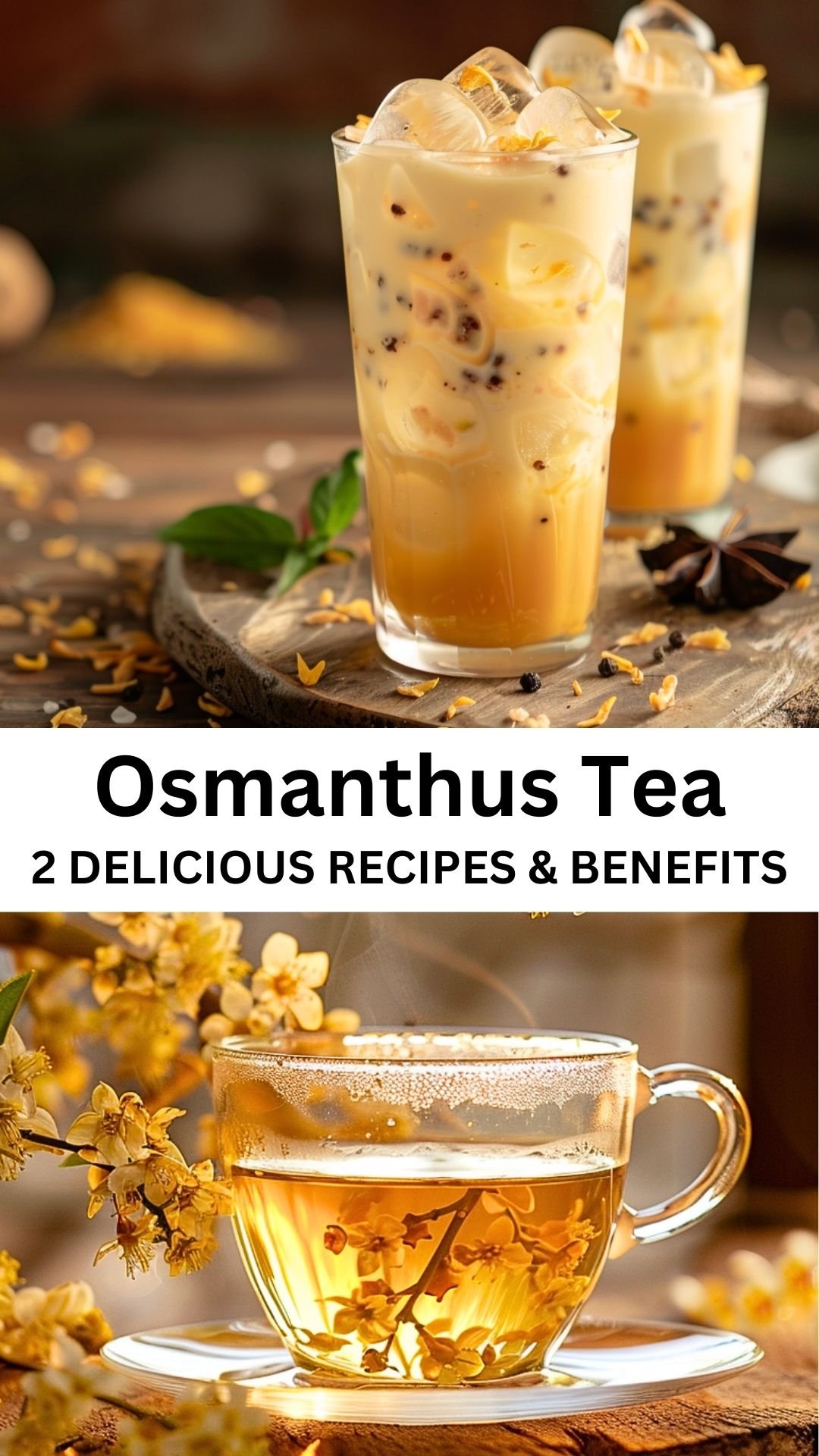
What is Osmanthus Tea?
Osmanthus tea is a fragrant and flavorful tea made from the dried flowers of the sweet osmanthus plant (Osmanthus fragrans). This plant, also known as sweet olive, is native to Asia and is particularly popular in China.
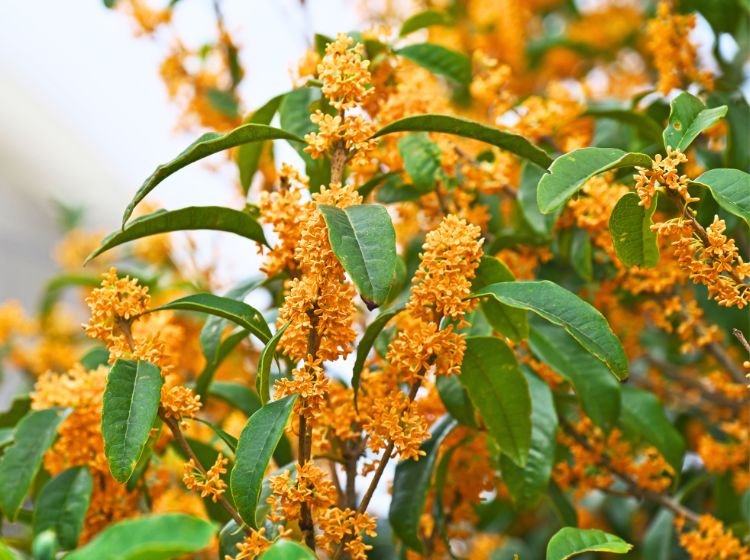
The small, golden-yellow flowers of the osmanthus plant release a captivating aroma that fills the air with the scent of spring florals and luscious fruit.
So what does osmanthus tea taste like?
Osmanthus tea has a unique floral and fruity flavor with a sweet and slightly tangy taste. It is often described as having a delicate, refreshing, and aromatic taste.
As you steep the dried osmanthus flowers in hot water, you will notice their distinctive sweet and fruity fragrance. This alluring aroma, combined with a delightful taste, makes osmanthus tea a highly sought-after beverage.
Recipe 1: Healthy Osmanthus Herbal Tea
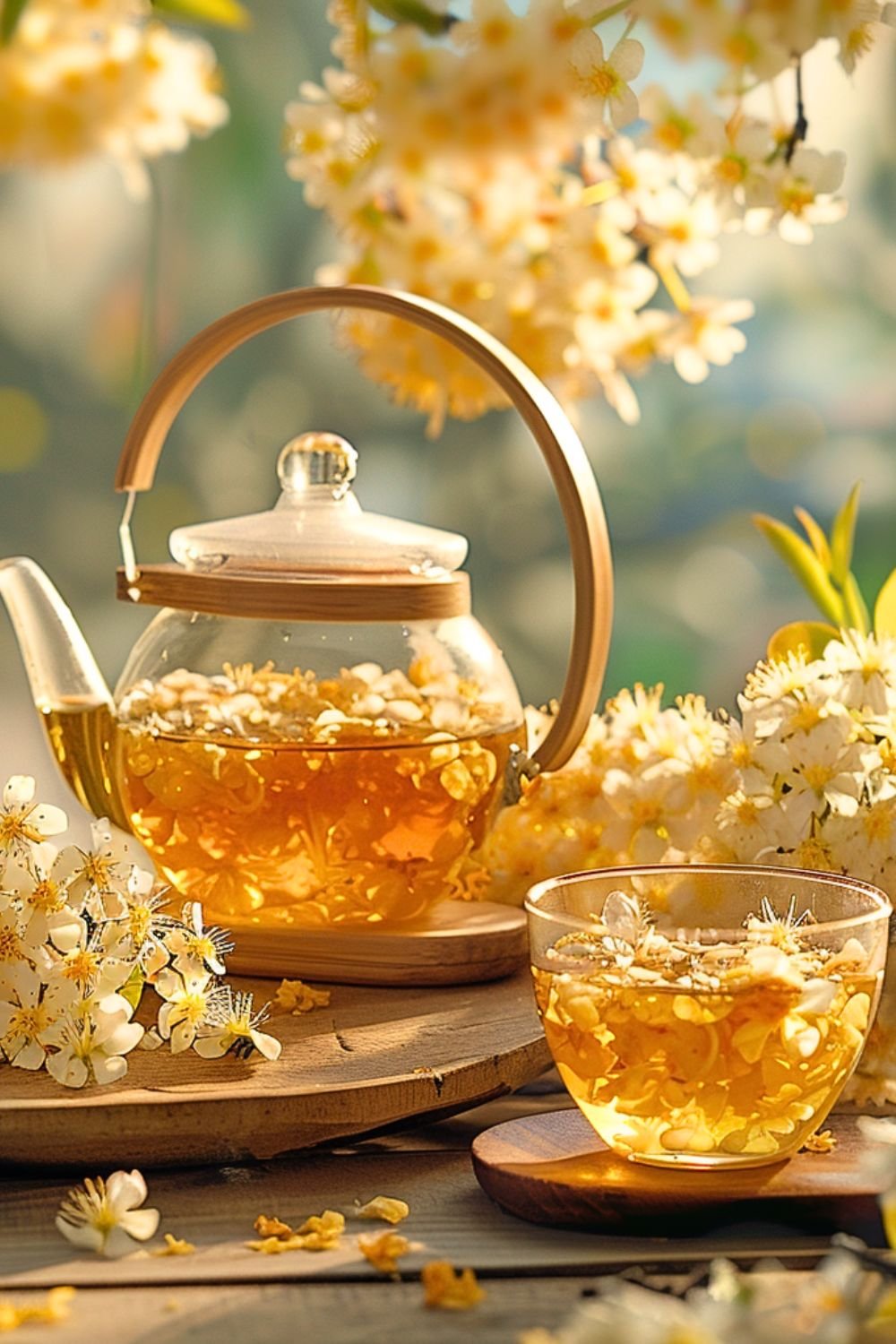
To enjoy the benefits of Osmanthus tea, begin by preparing it with a proper steeping method.
I recommend using Elitea Pure Osmanthus Flower Tea. This product is 100% pure fragrant dried osmanthus flowers grown in Southern China.
Ingredients:
- 1-2 teaspoons of dried osmanthus flowers
- 1 cup of water
Directions:
- Bring one cup of water to a boil in a small pot or kettle.
- Remove the pot or kettle from the heat source and let the water cool down slightly to about 195°F (or 90°C).
- Add one or two teaspoons of dried osmanthus flowers to the hot water.
- Let the tea steep for 2-3 minutes.
- Strain the tea and enjoy!
Note that the steeping time and amount of osmanthus flowers may be adjusted according to your personal taste preference.
Sweetness and Flavor
Osmanthus tea is known for its delicate, naturally sweet flavor profile. The distinct sweetness comes from the osmanthus flowers themselves, which have a pleasant, slightly fruity taste.
There is no need to add any sweeteners as the tea’s inherent sweetness is enjoyable on its own. However, if you prefer a stronger or different taste, you may choose to add a touch of honey or a slice of lemon. This enhances the flavor and adds a refreshing twist.
Recipe 2: Osmanthus Oolong Milk Tea – Hot & Iced!

I recommend using Cha Wu-Osmanthus & Oolong Tea for this recipe. These tea bags offer a delicious blend of osmanthus and lightly roasted TieGuanYin oolong tea.
Ingredients:
- 1 tea bag with osmanthus & oolong tea (or 1 tsp dried osmanthus flowers & 1 tsp oolong tea)
- 1 cup water
- 1/2 cup milk (dairy or any plant-based alternative)
- 1-2 teaspoons honey or sweetener of choice (optional)
Instructions:
- Heat Water: Begin by heating 1 cup of water in a kettle or on the stove until it reaches about 185°F (85°C), which is the ideal temperature for brewing oolong tea without scorching the leaves.
- Steep the Tea and Flowers: If you are using the tea bag simply put it in a large mug. If using loose leaf tea ingredients, add the oolong tea and dried osmanthus flowers in a tea infuser or directly into a teapot. Pour the hot water over the tea and steep for 3 to 5 minutes, depending on how strong you prefer your tea.
- Warm the Milk: While the tea is steeping, gently heat the milk in a small saucepan until it is warm but not boiling. If you prefer a frothy top, you can froth the milk using a frother or by whisking vigorously.
- Combine Ingredients: Once the tea has steeped, remove the tea leaves and flowers by lifting out the infuser or straining the tea. Stir in the honey or sweetener to the brewed tea and mix well until dissolved.
- Mix Tea and Milk: Pour the warm milk into the brewed tea and stir to combine evenly.
- Serve: Serve your Osmanthus Oolong Milk Tea hot, ensuring it’s well mixed and aromatic. For an added touch, you can garnish with a few extra osmanthus flowers on top.
Enjoy this floral and fragrant version of milk tea, which offers a unique twist with the addition of osmanthus, enhancing the natural sweetness and complex flavor profiles of oolong.
Iced Osmanthus Oolong Milk Tea
During hot summer months, I often prefer having my osmanthus oolong milk tea iced.
To make an iced version, start by steeping the tea as instructed above. Stir in your preferred sweetener while the tea is still warm. Next, add cold milk and pour over ice in a tall glass.
Enjoy your refreshing Iced Osmanthus Oolong Milk Tea!
Osmanthus Tea Health Benefits
In addition to its sensory appeal, osmanthus tea offers a range of potential health benefits, thanks to its rich polyphenol compound content.
In this guide, I will tell you all about the amazing benefits of osmanthus tea.
This information is based on centuries of use in traditional Chinese medicine, scientific studies, as well as my own experience.
Traditionally used in Chinese medicine, osmanthus tea has been valued for its potential therapeutic effects. Among these benefits are its ability to aid in digestion, suppress appetite, and reduce phlegm and stasis.
1. Rich in Antioxidants
Osmanthus tea is rich in antioxidants that help protect your body from the damaging effects of free radicals. Antioxidants support your overall health by boosting the immune system and increasing your body’s anti-oxidative defense.
Drinking a cup of osmanthus tea daily may improve your immune system and contribute to your overall well-being.
You can also combine osmanthus tea with green tea for even more antioxidant benefits. In a study analyzing the antioxidant effects of Osmanthus fragrans flowers combined with green tea, researchers found that the two ingredients exhibited synergistic antioxidant properties.
2. Has Anti-Inflammatory Effects
Osmanthus tea is known for its anti-inflammatory properties, which may help ease inflammation in your body. For example, it can help reduce congestion in the throat and mucus caused by inflamed lungs.
Additionally, the anti-inflammatory compounds of osmanthus may help alleviate inflammatory bowel disease and other gastrointestinal issues. It can also be used to treat menstrual pain by reducing inflammation and providing relief for stomach aches and diarrhea.
3. Positive Effect on Brain Chemicals
The compounds found in osmanthus tea can have a positive impact on your brain chemicals, particularly by influencing serotonin levels. As a result, drinking this tea may potentially improve your mood, reduce anxiety, and promote relaxation.
Remember, though, that more research is needed to fully understand the extent of these effects on the brain.
4. May Aid in Losing Weight
An interesting aspect of osmanthus tea is its potential effect on weight loss and appetite. Inhaling the aroma of Osmanthus tea can help curb your appetite because its scent decreases the activity of brain chemicals that stimulate appetite.
Drinking osmanthus tea frequently might help support your weight loss goals. By reducing your motivation to eat, you can have an easier time maintaining a healthy caloric intake and staying on track with your dietary plan.
There are also many other herbal options that can help with slimming down. For example, you can try piñalim tea for weight loss.
5. Supports Skin Health
Osmanthus tea has numerous skincare benefits as well. Its antioxidant content can help protect your skin from oxidative damage, which may prevent the development of early signs of aging, such as wrinkles and fine lines.
It has also been reported that drinking this tea can help maintain a healthy complexion and prevent macular degeneration.
Another delicious and fragrant for better skin health is vanilla tea.
Does Osmanthus Tea Have Caffeine?
Osmanthus tea is a herbal infusion that is naturally free of caffeine. This means you can drink it even late in the evening without worrying about losing your sleep.
However, it’s quite common to mix osmanthus flowers with green tea, black tea, or oolong tea. As a result, the blend might contain low to moderate levels of caffeine.
If you are sensitive to caffeine or trying to limit your consumption, pay close attention to the label and opt for pure osmanthus tea or a blend that is explicitly marked as caffeine-free.
Osmanthus Tea Side Effects and Cautions
Osmanthus tea has a wide history of medical use and is generally considered safe. According to a 2013 study, even a strong ethanol extract of osmanthus did not cause any adverse effects on mice.
One potential issue to consider is the possibility of allergic reactions to osmanthus. Although allergies to osmanthus tea are relatively rare, it’s essential to proceed with caution if you have a history of plant or floral allergies.
If you experience any signs of an allergic reaction such as itching, swelling, or difficulty breathing after consuming osmanthus tea, discontinue use immediately and seek medical attention if necessary.
Osmanthus Tea in Traditional Chinese Medicine
1. Detoxification and Kidney Support
In Traditional Chinese Medicine (TCM), osmanthus tea is respected for its purifying and detoxifying properties. Drinking this tea can aid in eliminating toxins from your body and providing support for your kidneys.
A well-functioning kidney system is crucial for maintaining overall health, as it helps remove waste products and excess fluids from your body.
2. Digestion and Stomach Health
Osmanthus tea is also recognized in TCM for its ability to treat digestive problems. This tea can help alleviate symptoms such as diarrhea and stomachache, making it a useful natural remedy for maintaining gut health.
Combining osmanthus tea with other ingredients that promote digestion, such as mint, can enhance its effectiveness.
These polyphenol compounds of osmanthus may also contribute to better gut health and a reduced risk of chronic diseases associated with inflammation within the digestive system.
If you are looking for more healthy herbal teas to support your digestion, I recommend that you also read my article about the benefits of trumpet leaf tea.
3. Respiratory and Endocrine System
Osmanthus tea may support the health of your respiratory and endocrine systems as well.
While more clinical research is needed to fully understand the extent of these benefits, the tea’s rich antioxidants and traditional use within TCM suggest that it could have a positive impact on these vital systems.
Remember that when you enjoy a cup of osmanthus tea, you’re not only indulging in a delicious, fragrant beverage, but you’re also partaking in a centuries-old tradition that hails from Asia.
Experience the unique taste and aroma of sweet osmanthus, as well as the potential health benefits that this delightful tea offers.
Enjoy Your Healthy Osmanthus Tea!
-Joonas

